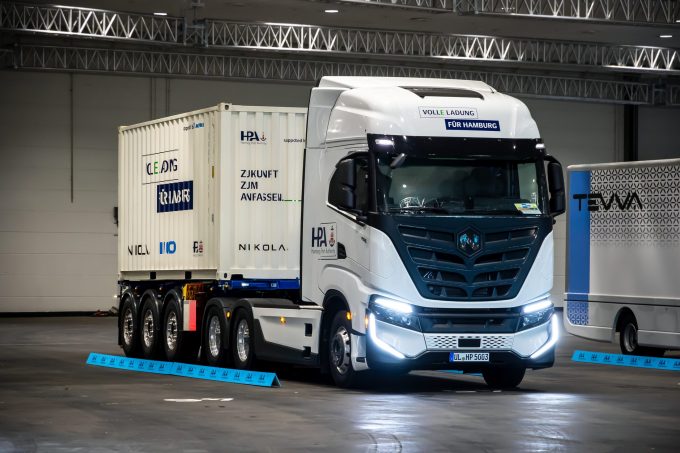Tougher EC emissions rules for hauliers 'could put SMEs out of business'
The stricter emission standards for HGVs adopted yesterday by the European Commission (EC) have been ...
TFII: SOLID AS USUALMAERSK: WEAKENINGF: FALLING OFF A CLIFFAAPL: 'BOTTLENECK IN MAINLAND CHINA'AAPL: CHINA TRENDSDHL: GROWTH CAPEXR: ANOTHER SOLID DELIVERYMFT: HERE COMES THE FALLDSV: LOOK AT SCHENKER PERFORMANCEUPS: A WAVE OF DOWNGRADES DSV: BARGAIN BINKNX: EARNINGS OUTODFL: RISING AND FALLING AND THEN RISING
TFII: SOLID AS USUALMAERSK: WEAKENINGF: FALLING OFF A CLIFFAAPL: 'BOTTLENECK IN MAINLAND CHINA'AAPL: CHINA TRENDSDHL: GROWTH CAPEXR: ANOTHER SOLID DELIVERYMFT: HERE COMES THE FALLDSV: LOOK AT SCHENKER PERFORMANCEUPS: A WAVE OF DOWNGRADES DSV: BARGAIN BINKNX: EARNINGS OUTODFL: RISING AND FALLING AND THEN RISING

Europe’s legislators must synchronise their green ambitions if they are to have any hope of migrating the continent’s trucking community to sustainable fuel vehicles, it was claimed this week.
Responding to news that the European Parliament was planning to bring forward the deadline for expanding its electric charging network, European Road Hauliers Association secretary general Marco Digioia said more was needed.
“Truckers support the push at both EU and country levels to migrate transport from fossil fuels to green solutions,” Mr Digioia told The Loadstar.
“However, with 70%-80% drivers working for SMEs, the key question is no longer about targets, but rather about ‘how’ we facilitate this transition.”
Between 2005 and 2020, renewable energy use across the European transport network increased from 2% to 10.2%, according to the European Environmental Agency (EEA).
However, this masks divergence between nations, with renewable energy usage in Greek transport, for example, at just 5.6% compared with 34% recorded in Sweden, and preliminary data from 2021 indicates that both Ireland and Italy were below 10%.
This means 95% of European truck journeys continue to be run on diesel, with alternative fuels at just 3.6% and electricity fewer than 1% of movements.
“The big challenge concerns the willingness of governments to engage,” said Mr Digioia. “We need to be sure they are supportive of these schemes and willing to show the same level of ambition we are seeing at some European levels.”
An updated Renewable Energy Directive has set a target in the transport sector of 45% by 2030. That target is across the sector, but as trucking handles more than 90% of European freight, with rail a distant second at 5%, a focus on haulage is key to achievement, he added.
Part of the problem truckers face is that, although biofuels predominate at the moment, they are being told to buy electric. However, the EEA reports says: “The electrification of road and rail transport has played a small role in the progress made so far.”
Mr Digioia added that, on the infrastructure side, the focus had been on hydrogen and LNG, as well as electricity, and stressed that drivers would need to be assured that investment in new trucks would have adequate support infrastructure.
“Hauliers are not opposed to this transition, but they need to know how they can do it, given the cost of making such a change,” he explained.
“We need to support hauliers because we can offer them the best financial incentive in the world, but without the infrastructure to fuel trucks they opt for, they will not make that choice. Every facet of this needs to be working in harmony.”
Listen to this clip of Steve McCrindle, DP World’s port operations director at Southampton, explain how the deployment of sustainable fuels at the quayside is now dramatically reducing emissions.
Comment on this article